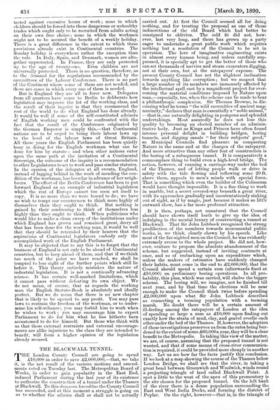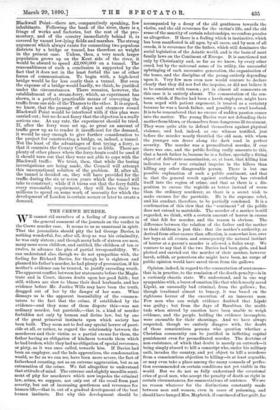THE BLACKWALL TUNNEL. T HE London County Council are going to
spend £10,000 in order to save £2,000,000,—that, we take it, is the net result of the various motions and amend- ments voted on Tuesday last. The Metropolitan Board of Works, in order to gain popularity in the East End, induced Parliament during the last year of its existence to authorise the construction of a tunnel under the Thames at Blackwall. To this damnosa hwreditas the County Council has succeeded, and at this moment a struggle is going on as to whether the scheme shall or shall not be actually carried out At first the Council seemed all for doing nothing, and for treating the proposal as one of those indiscretions of the old Board which had better be consigned to oblivion. The cold fit did not, how- ever, last very long, and there has grown up a party eager to undertake a great public work which requires nothing but a resolution of the Council to be set in operation. The love of imaginative engineering exists in almost every human being, and unless carefully sup- pressed, it is specially apt to get the better of those who can set thousands of navvies and steam excavators digging, not at their own, but at the ratepayers' expense. The present County Council has not the slightest inclination towards anything like corruption ; but we suspect that a large number of its members are immensely affected by the intellectual spell cast by a magnificent project for over- coming the material conditions imposed by Nature upon man,—especially, too, when the scheme can be made to bear a philanthropic complexion. Sir Thomas Browne, in dis- cussing what he terms " the wild enormities' of ancient mag- nanimity," declares that man is essentially a " noble animal," —that is, one naturally delighting in pompous and splendid undertakings. Most assuredly he does not lose this quality by becoming an elected member of an adminis- trative body. Just as Kings and Princes have often found intense personal delight in building bridges, boring tunnels, and digging canals " for their subjects' good," so Municipal Councils find pleasure in conquering Nature in the name and at the charges of the ratepayer. And more attractive than any other feat of construction is the boring of a subaqueous tunnel. It is comparatively a commonplace thing to build even a high-level bridge. The notion, however, of running a carriage-way under the bed of the Thames, and of letting people walk or drive in safety with the tide flowing and reflowing some 20 ft. above them, appeals to men's minds with special force. That is something which even the builder of the Colisseum would have thought impossible. It is a fine thing to work in marble, but a secret covered-way beneath a great river, with its approaches gradually and unostentatiously sinking out of sight, as if by magic, just because it makes so little outward show, has a far more profound attraction.
It is then, perhaps, not unnatural that the Council should have shown itself loath to give up the idea of indulging in the mental luxury of constructing a tunnel at Blackwall. That Sir John Lubbock recognised the strong predilection of the members towards monumental public works, is, we think, clearly shown by his speech. Like most of the far-sighted men on the Council, he was evidently extremely averse to the whole project. He did not, how- ever, venture to propose the absolute abandonment of the scheme, but suggested, instead of inviting contracts at once, and so of embarking upon an expenditure which, unless the makers of estimates have suddenly changed their habits, must come in the end to £2,000,000, that the Council should spend a certain sum (afterwards fixed at £10,000) on preliminary boring operations. In all pro- bability, this plan, which was carried, will shelve the bigger scheme. The boring will, we imagine, not be finished till next year, and by that time the elections will be near enough to make the Council think twice before spending £2,000,000 upon what Sir John Lubbock described as connecting a teeming population with a teeming marsh. No doubt there will be a certain amount of ill-feeling among the ratepayers of London at the idea of spending so large a sum as £10,000 upon finding out exactly how the strata of mud, clay, and gravel overlie each other under the bed of the Thames. If, however, the adoption of these investigations preserves us from the rates being bur- dened to the extent of some £60,000 a year, ,they will be a clear benefit to the Metropolis. In taking this view of the matter, we are, of course, assuming that the proposed tunnel is not wanted, and that if some means of cross-river communica- tion is required, it could be provided more cheaply in another way. Let us see how far the facts justify this conclusion. If we look at a map showing the course of the Thames below London Bridge, we shall see that the river, in taking a great bend between Greenwich and Woolwich, winds round a projecting triangle of land called Blackwell Point. A spot a little to the west of the apex of this promontory is the site chosen for the proposed tunnel. On the left bank of the river there is a dense population surrounding the East and West India Docks, and forming the district of Poplar. On the right, however—that is, in the triangle of Blackwall Point—there are, comparatively speaking, few inhabitants. Following the bank of the river, there is a fringe of works and factories, but the rest of the pro- montory, and of the country immediately behind it, is covered by vacant low-lying fields and marshes. The strong argument which always exists for connecting two populous districts by a bridge or tunnel, has therefore no weight in the present case. Unless, then, a very much larger population grows up on the Kent side of the river, it would be absurd to spend £2,000,000 on a tunnel. The reasonableness of such a conclusion is supported by the fact that it does not in the least forbid the use of other forms of communication. To begin with, a high-level bridge would be far less costly than a tunnel. But even the expense of a bridge would hardly, we think, be justified under the circumstances. There remains, however, the establishment of a steam-ferry, which, as experiment has shown, is a perfectly practicable means of conveying the traffic from one side of the Thames to the other. It is argued, we know, that the passage of ships and steamers round Blackwall Point would be interfered with if this plan were carried out ; but we do not fancy that the objection is a really serious one. At any rate, the experiment should be tried. If, after the ferry were set up, so great an amount of traffic grew up as to render it insufficient for the demand, it would be easy enough to give further consideration to the project for constructing a bridge, or, indeed, a tunnel. Not the least of the advantages of first trying a ferry, is that it commits the County Council to so little. There are plenty of other places where the ferry-boats could be used if it should turn out that they were not able to cope with the Blackwall traffic. We trust, then, that while the boring investigations are being made, the Council will attempt this unsensational solution of the problem. If, after all, the tunnel is decided on, they will have provided for the traffic during the six or seven years which the tunnel will take to construct ; while if it turns out that the ferry fulfils every reasonable requirement, they will have their two millions to spend on some work of necessity for which the development of London is certain sooner or later to create a demand.







































 Previous page
Previous page